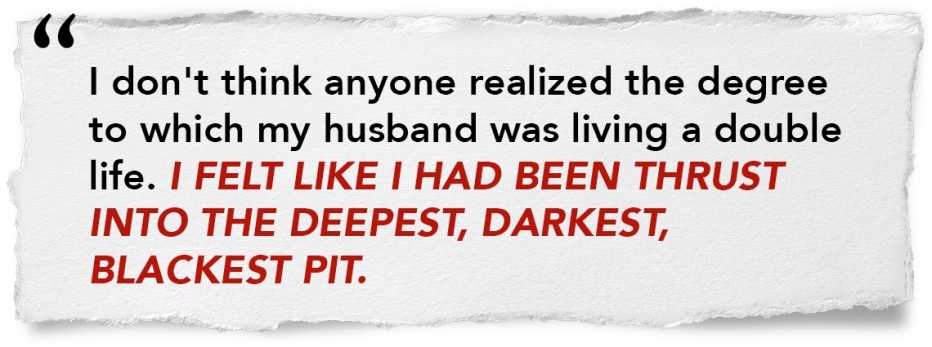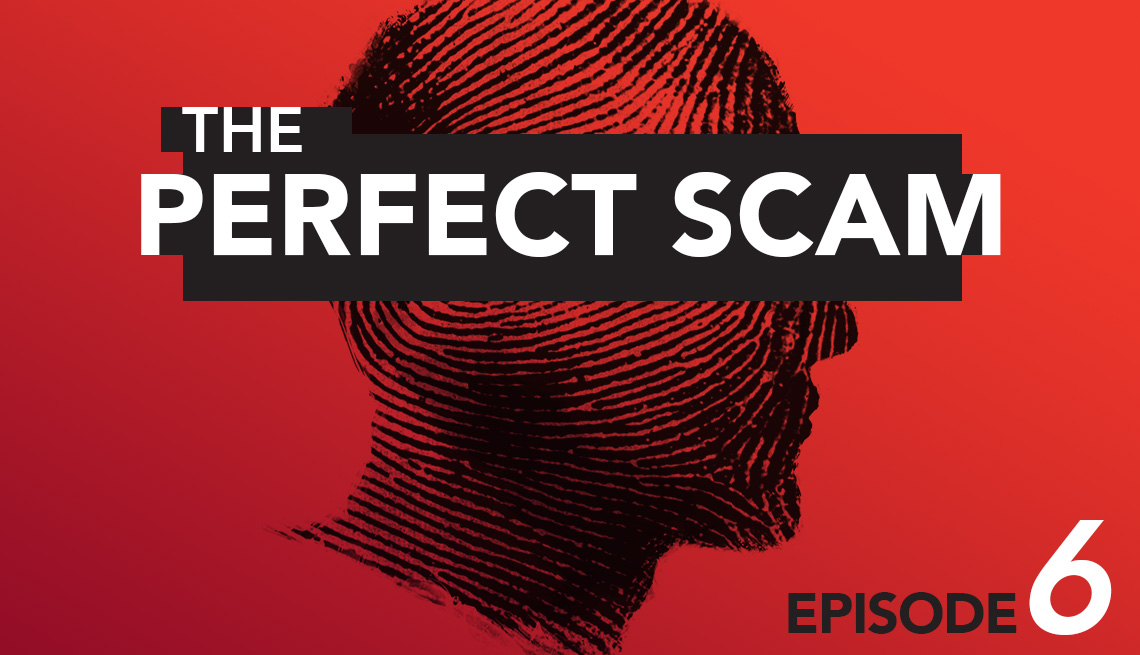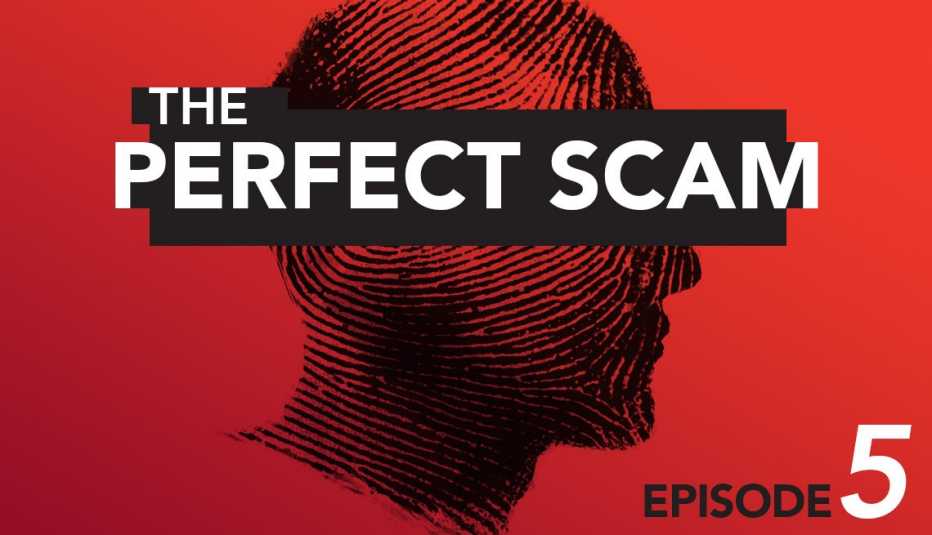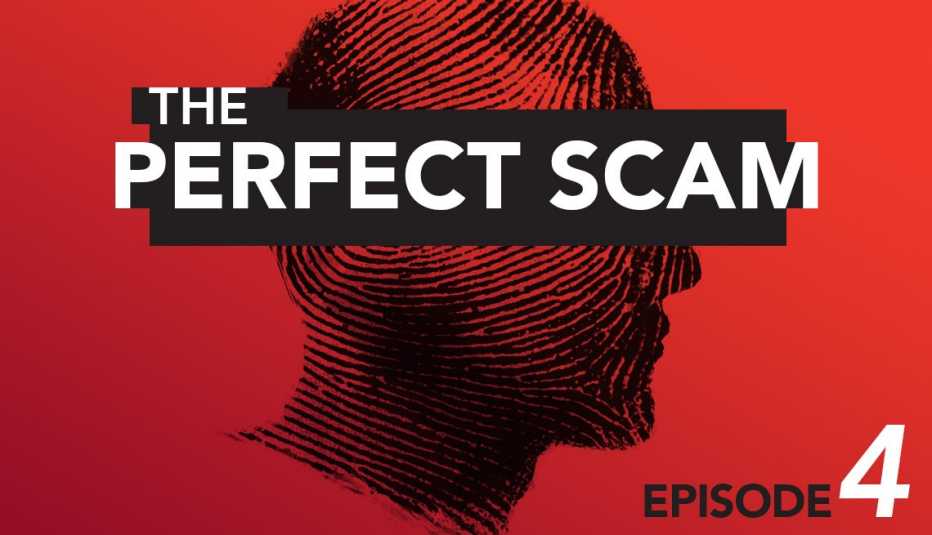AARP Hearing Center
Subscribe: Apple Podcasts | Amazon Music | Spotify | TuneIn
Andrea’s husband secretly operated a Ponzi scheme for 15 years and stole millions of dollars from investors, including their family, friends and neighbors. This is her story of how she found out about the scheme and what’s happened to her life since her husband was convicted.
TIPS: Do your research. Check that you are investing with an accredited firm or financial adviser. Make sure they are up to date on all licensees. Don’t invest with anyone promising extravagant returns.


[00:00:01] HOST: Coming up on this episode of AARP's Perfect Scam.
[00:00:04] I don't think anyone realized the degree that he was living a double life. It was a very devastating, indescribable time. I felt like I had been thrust into the deepest, darkest, blackest pit. I could never have imagined.
[00:00:20] HOST: For the AARP's Perfect Scam Podcast, I'm your host, Will Johnson. On today's episode, we'll share with you the story of a woman who spent most of her adult life married to a man she really didn't know. A man who was leading a double life, scamming victims of millions of dollars, and for a long time, getting away with it. Her story gives us a glimpse into how someone can turn a small coverup into a big time scam, and how you can make sure you can tell the difference between a legitimate investment and a phony one. Here to help me do all that is my cohost and AARP's Fraud Watch Network Ambassador, Frank Abagnale. Frank, good to have you here.
[00:00:54] Frank Abagnale: Thanks, Will, good to be here.
[00:00:56] HOST: With the FBI, over 41 years or so, has this been a major topic?
[00:01:00] Frank Abagnale: Ponzi scams have been around forever and go on every single day. You give me so much money, I tell you I'm going to invest it in something. I come back, give you your money back, plus a bunch of money. And then I come back to you again. Eventually you say, well yeah, I made a lot of money with Frank last time, I'm going to do it again with Frank, and eventually you end up losing.
[00:01:20] HOST: Andrea Merriman, first met her husband, Sean, when they were students at Brigham Young University in Provo, Utah.
[00:01:26] Andrea: We lived in the same apartment complex, we got to know one another, we dated, and by May of 1989, we're engaged and then married later that year. And that is how we got our start.
[00:01:44] HOST: Was the church a big part of your lives growing up, and then part of your marriage as well?
[00:01:48] Andrea: The church was a big part of my life growing up. My husband converted to the church when he was 18 and then after we married of course, you know our faith was a big part of our family, our family life, and was a great motivator in most everything that we did. He served as a bishop of a congregation, but all positions in the LDS church are lay positions, so you're not paid. So, he did serve as a bishop for five years, but he wasn't compensated.
[00:02:26] HOST: What then did he do for work, if you don't mind telling us, as sort of his job.
[00:02:33] Andrea: After we graduated from college, we moved to Denver to begin our family and our careers, and he decided that he wanted to be a stockbroker. He had graduated with a bachelor's degree in economics, and was interested in the stock market and finance. I believe it was the fall to December of 1993, he decided that he wanted to open his own investment company and just privately manage a pool of funds of investors and that's when he began his company that he called Market Street Advisors. And he let all, all of his licenses lapse, and became just a private citizen managing a pool of money according to investment strategies that he created.
[00:03:27] HOST: Which on the surface would be just fine, right?
[00:03:29] Andrea: Yes, and I believe that's what I believed he was doing. That's what I believed his investors believed he was doing, and it probably started out that way, but I'm told it was not very far into that investment company venture that his Ponzi scheme began.
[00:03:49] HOST: How did he begin it? Who did he started reaching out to and who was he luring into this Ponzi scheme and can you tell us briefly how it, how it worked? I know that can be confusing.
[00:03:58] Andrea: He said he didn't know exactly when it had begun, but it had been a loss of less than $5,000 that he had covered up. He had left it off his statements. I think he had good intentions. I think he had the intent to make it up the next month and then cover the loss and everything would be okay, but once you hide losses, you've committed fraud. And so, it was too late even then. So, his fraud, his Ponzi scheme initially began because of a loss of less than $5,000, and in the end, he was convicted for over $20 million.
(MUSIC SEGUE)
[00:04:47] HOST: I could give it a go, but I think you would probably be in a better position to just briefly explain how his Ponzi scheme worked or how, in general a Ponzi scheme like his would have worked.
[00:04:56] Andrea: He, in the end wasn't even investing money. He was just accepting new money from new clients, and using that money to pay off old clients or clients who needed distributions, and to fund you know his lifestyle. So, you're really not getting what you think you're paying for. The money was not being invested. The money was just being redistributed and Ponzi schemes rely heavily on new money continually coming in so that they can keep that cycle of money going between all the people.
[00:05:33] HOST: So it went from a $5,000 loss to I think you said 20 million.
[00:05:37] Andrea: Uh-hum.
[00:05:38] HOST: That was owed to a lot of good people.
[00:05:40] Andrea: In the end.
[00:05:41] HOST: Yeah. Were they people that you knew?
[00:05:43] Andrea: Some of my own family members, my mom was one of the first investors in his Ponzi scheme. My siblings invested, neighbors, friends, family of friends, friends from church, old friends and then you know associates that he met through jobs or hobbies or travel. He, he was constantly cultivating relationships with people.
[00:06:09] HOST: Were there any signs along the way to you? Obviously, there were no obvious signs that he was doing something criminal, but as you look back on it, you mentioned that one time he came to you and said, you know, I'm worried, I'm anxious about something at work. Did you feel like there was something nefarious going on?
[00:06:24] Andrea: I believe he managed to perpetuate his Ponzi scheme for about 15 years from 1993 until 2009. And never once in all of that time did I ever have a clue that things weren't going well, or that things that were illegal were taking place. Now, I was just his wife living my life and raising our family. I was not involved in his business, but he had an accounting firm and he had employees and no one else caught on. And then was also audited by the IRS for an entire year before he came forward and they never caught on to anything illegal going on either.
[00:07:13] HOST: Obviously, within a marriage, there can be secrets. This is one where he was really leading a double life in a sense.
[00:07:24] Andrea: Absolute 100 percent double life. The way he acted as a family man, as a husband, as a father, as an upstanding member of the community, he was constantly trying to help people, to serve people, he went to church every week, he, you know practiced his religion outwardly, and I don't think anyone realized to the degree he was, that he was living a double life. I never had a clue he was living a double life ever, in all those years.
[00:07:59] HOST: How many children do you have again?
[00:08:01] Andrea: We have four children.
[00:08:05] HOST: So obviously this is something that has impacted the entire family and the way it turned out. How did it unravel? You said he went forward, he came forward eventually?
[00:08:16] Andrea: He did. Um, in March of 2009 he hired an attorney and confessed his crimes to his attorney. The next day, he and his attorney went and met with representatives of the U.S. government and revealed his Ponzi scheme crime, and then they all gave him until the next day to tell me. So, I found out on March 18th, 2009, so I can vouch for the fact that the spouse really can be the last one to know because in this case I was. I was the last to find out and it was something I never expected. It was completely shocking, in fact, it was close enough to April Fools' that when he first told me, I thought maybe he was pulling an early April Fools' Day prank or something. I didn't think it was funny, but I couldn't figure out what he really was trying to tell me. It took a while for it to sink in.
[00:09:17] HOST: I can't even imagine what that was like for you. And did he come to you and he told that one-on-one? Or did you find out, it wasn't in the news or anything, right? You found out from him.
[00:09:27] Andrea: No, no, he, I was out running errands and he called and asked if I could meet him at our home, that he wanted to spend some time with me. So, I came home, and I met him in the kitchen, without missing a beat, he just went right on into, “My company, Market Street Advisors, is a sham.” And he said, "I've actually been running a Ponzi scheme." He followed it up with the fact that he had hired an attorney two days before, that the day before he had turned himself into the government, and that they had all given him until that moment to tell me, and then he told me that he anticipated being charged within something like a week, sentenced within six weeks and taken into custody and then at that point, I would be on my own to raise our four kids. And he explained that all of our assets were frozen, that everything we'd acquired in our almost 20-year marriage was gone. And I still wasn't proc--, processing everything completely, because I remember just being totally shocked and alarmed and overwhelmed by the thought that I knew someone that would be going to prison, and that I was left alone to raise four kids and to provide for them, and I remember saying, "Oh, at least our house is paid off." And he said, "No, you don't understand. The house is gone, the cars are gone, our savings is gone, our investments are gone, everything of value is frozen or gone, or will shortly be gone." So, I was on my own with no job, no money, no prospects; four kids, two dogs, and no parents, no one to fall back on and to rely on. It was a very devastating, indescribable time. I felt like I had been thrust into the deepest darkest blackest pit I could never have imagined in my worst nightmare, but it was suddenly my actual real life.
(MUSIC SEGUE)
[00:11:49] HOST: Was he apologetic when he came to you? Or was this, it sounds almost, it sounds almost matter of fact.
[00:11:57] Andrea: Yeah, he, he was a very matter of fact person. And didn't ever show a lot of emotion. But, so he was fairly calm, I mean I was blown away by what he said because he seemed so normal from the outside, but after he told me some of those main things, then he started to cry, and when he started to cry, that's when I thought, oh my gosh, this is real, he's not kidding. Waves of sickness and shock and disbelief and horror and every, you know, hard, terrible thought you can imagine was just washing over me, continually. And at the same time, I'm trying to make sense of what he's saying, and trying to realize what it means for me. It was the worst moment of my life. I wouldn't wish it on anyone.
[00:12:57] HOST: And we're talking about a moment that you describe as the worst moment of your life, and then obviously you've had, since then, 7, 8 years now if my math is correct, on when he first came to you to rebuild your life, I would imagine?
[00:13:13] Andrea: Well, it's a continual process. Um, I have learned that rebuilding from complete financial devastation and loss takes time. So, it has been 8 years, and I am in a better position for sure than I was in 2009, but I am nowhere where I planned to be or thought I should be or in all honestly, where a 50-year-old ought to be. So, I don't anticipate ever being able to retire or do anything like that. I will be working to put a roof over my head the rest of my life, and I will be continuing to attempt to recover for many, many years to come.
[00:14:00] HOST: Have you been able to forgive your husband?
[00:14:02] Andrea: From the beginning I knew that for me, personally, that was something that I had to do. I had to do it thoroughly, and I had to do it completely. I have seen too many people go through losses, even the loss of a marriage, and they couldn't forgive, and I just watched them go on to never be able to recover, and in the end, they practically destroyed themselves and their children by their refusal to forgive. So, I knew that I couldn't have that happen to me. So, I worked to forgive him, and I have. Forgiveness I've learned is a continual process. Sometimes feelings or thoughts resurface that I need to work to forgive again, or new facts come to light, and I have to work to forgive again, but yes, I have forgiven. I believe that for, you know, failing to forgive or holding onto hatred or anger, it's like acid. It only hurts the vessel that tries to contain it, and I think that's a horrible loss if you lose your money and you lose yourself in the process. So, I didn't want that to be me.
[00:15:12] HOST: And your husband was sentenced to 12½ years back in 2010, is that right?
[00:15:18] Andrea: I think his sentencing took place in 2009. So, he received 12½ years for the crime that he committed, and he anticipates being released from prison sometime around August of 2020. So, he has been in prison all of these years and is still there.
[00:15:39] HOST: Our show is about scams and fraud, and you're in a unique and extremely difficult position, because of what your husband did, of being able to experience both sides of it in a sense in that you were close to your husband, I assume as part of the marriage and you saw and found out what he was doing, although you didn't have any inkling as it sounds. And then you also have family and friends who were investing and I'm guessing you've learned of victims that have come out of this. What is that feeling like of being sort of if, if I've described that at all aptly of the being in the middle of this, this situation that wasn't your doing?
[00:16:20] Andrea: Well, it's a, it's a really hard position to be in. I think people look from the outside. I had friends accuse me of, you had to have known. You're too smart not to have known. When you're married to someone, there's no way you can't know what they're up to. It's, you just feel very alone. If I could have walked off the face of the earth and dropped off into, you know, oblivion, I would have loved to have been able to do that. It was, it was a very, very hard time.
(MUSIC SEGUE)
[00:17:01] HOST: What do you hope to get out of it when you tell the story?
[00:17:04] Andrea: I hope by telling this story that I save someone from crossing that line that should never be crossed, that line of fraud. So, my message to the world is to choose integrity and to live with ethics and integrity and no matter what, to never abandon those no matter what the stakes are. That's why I tell my story. If I can save one person from the consequences that my kids and I have lived through, then I'm willing to talk about the horror that I've lived through.
(MUSIC SEGUE)
[00:17:41] HOST: I'm back with the AARP Fraud Watch Network Ambassador, Frank Abagnale. Frank, it's a harrowing story Andrea has to tell. First thoughts?
[00:17:49] Frank Abagnale: Well, first I thought it was an amazing interview, but it is the same story that's been told many, many times, and 99 percent of Ponzi scams involving the wife, the wife did not know what the husband was doing. Many wives are not involved in their husband's business. Some don't take an interest in it, others just, husbands don't have their wives take interest in their business, so I believe 100 percent that she knew nothing about it. And yes, you don't realize that when you do anything like this, there are victims far beyond the victims you victimize. There's family members, people related to you, people who care about you. They all become a victim, so right off the bat I feel very sorry for her, and I feel very sorry for her children that he would put them through that. And so, you know when I told you that I turned my life around, the biggest thing of being married and having children was, for me was that I would never do anything to harm them, embarrass them, or hurt them. That was the real thing that kept me from ever going back to doing something. I would never want to put on my children some burden of having to live with that or deal with that. So, and she's right, people immediately think you knew about it, just as they did in the case of Madoff's wife, you couldn't be around this and not know it's going on, but the truth is, most of the time they don't know it's going on. Her story is the classic story of the Ponzi scam, and really what was the Madoff story, although Madoff was a bigger dollar amounts were involved, and many more people were involved.
[00:19:26] HOST: And with the FBI, have you had the opportunity to meet people who have been involved in Ponzi schemes like this?
[00:19:30] Frank Abagnale: Yes, and her, just like she's saying, for people that were victims of the Ponzi scam, people lost their life savings, lost their home, and whether they send the guy to jail for 50 years, the Ponzi, the scam artist, or they hang him in Central Park, it's not going to get your money back. So once you lose your money, your money's gone, so whatever happens from that point on, you've lost everything you have. So it's not only about what she lost, which was a great deal, but all the people who lost their earnings and their money and from, from that same scam. And the other thing I'd point out is that, you know, you have to be in, and what always surprises me is most of the victims a lot of the times are very smart people, but you want to say to them, look, you know what the average return is on an investment. When someone starts saying to you that it's 100 percent, 75 percent return, those things are just too good to be true, and those are the kind of things you really need to question, as whether they're true or not. Especially people who don't have a lot of money. You know, when you're retired and you're, you know it used to be we got to be 65 years old, you're pretty old. You might live another five years, you owned your house, you didn't need a lot of money, now you might live another 30, 40 years and be in your 90s, you have to ask yourself, how am I going to support myself for another 30 years of zero income? So you have to be very careful about how you take care of your savings and your money, and you don't want to take changes like that, even when they look legitimate, you know, you're not in a position to take those chances, and you shouldn't.
[00:21:00] HOST: Well, Frank, and the bottom line I hope for a lot of our listeners is, as always, be really careful where you invest your money, who you send your money to, who you give money to, but in this case, we’re talking about investment schemes, and hopefully not a scheme, but be careful with your money. Hey, I've got a great friend who's doing some investing, would you like to put some money his way? You're like be cautious about it.
[00:21:22] Frank Abagnale: That would raise a red flag for me, so I have no problem investing with a major bank, a major investment company, but you've got to remember in the case of, and I just point this out, in the case of Madoff, you know, a lot of people were ripped off that they're, they took the advice of their investment banker from a larger financial institution, or something they totally trusted, but that person then, in turn, trusted Madoff to be legitimate, so they were giving you advice based on their relationship, so even then, you know you, you want to question and make sure you put your money. Money's something you don't want to lose, you've got to be real careful what you do with it.
[00:21:57] HOST: Alright, the AARP Fraud Watch Network Ambassador and cohost of The Perfect Scam, Frank Abagnale, thanks, once again.
[00:22:02] Frank Abagnale: Thank you.
[00:22:03] HOST: For more information and resources on how to protect yourself from becoming a victim of a scam, visit AARP's Fraud Watch Network website, AARP.org/fraudwatchnetwork. Alright, many thanks to our producers, Julie Getz and Brook Ellis, our audio engineer, Julio Gonzales, and of course, my cohost, Frank Abagnale. Be sure to find us on Apple podcast, or any of the many fine podcast outlets you choose to visit.
END OF TRANSCRIPT






































































